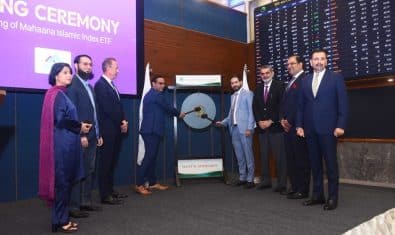The Federal Board of Revenue (FBR) will consider viable budget proposals of the Karachi Chamber of Commerce & Industry (KCCI), which recommended out-of-box solutions to avoid further downslide in the economy with top priority in PSDP allocation to revamp and rebuild the dilapidated infrastructure of Karachi.
According to KCCI’s budget proposals, the city of Karachi, which contributes over 65 percent in tax revenue and has over 50 percent share in Pakistan’s total exports, has to be given top priority in PSDP allocation to revamp and rebuild the dilapidated infrastructure of the city.
KCCI believes that out-of-box solutions are needed to avoid further downslide in the economy. It is important for the decision-makers in the government to have a better perception of the ground realities of Pakistan’s economic landscape and business dynamics. There is a need to do away with a coercive, outdated, and complex tax regime and come up with policies that stimulate the growth and global competitiveness of Pakistan, KCCI added.
Although the government has streamlined the faster system, yet the exporters were facing a liquidity crunch amid the condition of filing claims only after dispatch of shipment which takes at least three months.
To further enhance exports, it was imperative to revive SRO 1125 in its true spirit and reintroduce a system of no payment and no refund of Sales Tax for the five export-oriented sectors.
KCCI pointed out that the indenting commission should be treated as export proceeds and taken out of the purview of provincial service taxes. Indenting agents serve all of Pakistan hence, they should remain in the export regime like IT and other service providers.
Highlighting the unjust turnover tax on traders of cotton yarn, KCCI mentioned that traders/ brokers of cotton yarn were subjected to turnover tax at a concessional rate of 0.1 percent which constitutes about 10 percent of their margin. However, demands were issued under section 113 of the Income Tax Ordinance to pay turnover tax at the rate of 1.5 percent which was more than the meager commission of 1 percent received by traders from Spinning Mills for their sales to the weaving industry. Hence, the correct approach for levy of concessional rate on yarn traders is by inserting provision of Minimum Turnover Tax at the rate of 0.1 percent in the First Schedule Part-I, Division IX exempting yarn traders from a minimum 1.5 percent.
KCCI recommended that access to bank accounts should only be limited to accounts of unregistered persons with unusually high amounts of transactions. Commissioner should only be authorized to obtain information about the funds in accounts and to seek clarification on the nature of transactions and sources of funds and all such unregistered must be brought into the tax net.
Through Finance Act 2019, powers of Commissioners & Board were restored to select cases for audit every year which further creates difficulties for registered persons. Therefore, audits under Section 177 & 214C should be carried out once every 3 years through the restoration of clause 105 omitted in Finance Act 2019, KCCI suggested and added that even with this restriction, the Commissioner can carry out assessment u/s. 122(1)/(5) or 122(5A) on the definite information or where the declaration of the taxpayer is erroneous and prejudicial to the interest of revenue.
KCCI stressed that the powers of the Commissioner and subordinate officials should be curtailed to restore the trust of taxpayers and encourage a broadening of the tax base. Such audits should be restricted to specific queries or objections and call for the relevant document only rather than opening and re-opening a comprehensive audit every time.
Despite being allowed to modify returns within 60 days under Clause 26(3), Sales Tax Return Revision – Rule – 14A & Section 26(3), taxpayers were still required to obtain approval from Commissioners IR for return revision. Hence, Sec. 26(3) should be applied in letter & spirit and the e-filing system should be updated to automatically reopen the return revision within 60 days of return filing.
Moreover, KCCI has also suggested that the requirement of making payments of expenses through digital means should be abolished or at least the threshold should be increased significantly while on non-filing of return, the department should only exercise the power to suspend the registration of taxpayers who fails to file the return for six consecutive tax periods and issue Show Cause Notice to such individuals.
It was further mentioned that builders who have availed the scheme stated in Section 100D are provided the benefit of a fixed tax regime. However, those builders who had failed to avail this scheme due to delay in NOCs or inability to meet the criteria are subject to a higher rate of tax. Therefore, a fixed tax regime for those builders who had failed to avail the scheme under Section 100D should also be introduced.
KCCI further proposed that all kinds of industrial machinery used in the production of goods may be exempted from Sales Tax if imported by manufacturers and if such machinery is not manufactured locally.
Machinery imported by Commercial importers may be released on payment of Sales Tax at the rate of 10 percent. While referring to excessive penalties in case of non-integration with the POS system, KCCI suggested that the government should look into the possibility of reducing penalties to not more than Rs. 500,000/- and this penalty procedure should be fragmented into four stages wherein a penalty of Rs50,000 shall be fixed at the first stage, Rs. 150,000 at the second stage, Rs. 300,000 at the third stage and Rs500,000 at the fourth stage. “Moreover, the definition of Tier-I retailers should be amended as the size of a retailer should not be measured by the fact that it has an air conditioning facility and credit card machines or not. This provision is illogical and is placing an unnecessary burden on small-scale retailers who have committed the mistake of being in an air-conditioned mall. The yardstick to measure whether a person is a Tier-I retailer should be based on its turnover and the size of the shop.”
KCCI also proposed that zero-rating on the supply of raw material and plant & machinery to Export Processing Zone (EPZ) industries should be restored which would encourage economic activity and expansion.
KCCI’s proposals for Budget 2022-23 carry greater importance and focus on the macro-economic issues, taxation policy, and administration which have a profound impact on the business and investment environment. In addition to highlighting the problems faced by SMEs which are major contributors to GDP, KCCI’s proposals also suggest measures to deal with Fiscal and Current Account deficits.
KCCI’s Budget Proposals emphasize that the tax administration, laws, and provisions with discretionary powers need reforms and most importantly the mindset of the tax hierarchy needs to have a positive outlook to achieve the goal of broadening the tax base and create a civilized tax culture. “This will only happen when a taxpayer gets the respect he deserves, is treated as a partner in revenue generation and growth and accountability are ensured at both ends.”


























